Table of Contents Show
Some choose stationary RV living from the start, and for others, life circumstances can cause them to park their RV for a bit. Whatever the reason, there are some things you can do to get the most out of your experience.
Today, we want to share a few tips and tricks you can use if you find yourself stationary in an RV. Let’s get started!
Can You Live Year-Round In An RV?
Many RVers live in a variety of climates year-round in their RVs. Some RVs have four-season ratings, making them more capable of handling temperature changes.
If you’re planning to be in your RV during the winter months, you can beef up the insulation or add skirting around the base of your camper. This type of insulation helps protect your RV from the cold winds surrounding your RV and potentially causing damage to your RV.
Year-round living in an RV is most definitely possible, but extreme weather can make it challenging. Summer months will likely require you to have a power source capable of running an air conditioner to stay comfortable while in your RV.
Your preparations will vary depending on the climate where you’re setting up camp. An ideal spot would be a moderate climate that’s not subject to extreme temperatures in the summer or winter. However, if you put in a little bit of effort, it’s possible to live year-round in pretty much any climate.

Pro Tip: These tips will help you stay warm in your RV during winter.
Can You Live In An RV On Your Own Land?
You may think that because you own the land, you’re able to do with it as you wish. However, if you try to live in an RV on your land, there’s a chance you could run into legal issues. Some locations have ordinances regarding the legality of living in an RV.
Depending on where you live, your local code enforcement may prohibit you from living in an RV on your own land. You’ll want to talk to your local authorities to confirm the legalities of living in an RV on your land. If you’re buying land, you may not be able to have utilities run to the property without a permanent structure on the land.
If you live in an area that is friendly with RV living, you can easily live in an RV on your land. You can customize your setup to fit your needs for power, sewer hookups, and water connections. Stationary RV living on your property can be a great way to live, especially if you’re able to enjoy space and privacy.
Pro Tip: If you plan to RV on your own land, create a level parking space by learning how to build a camper pad.
Can You Live In An RV in a Backyard?
When it comes to living in an RV in a backyard, it can depend. You not only have to worry about the county or local ordinances but also if you’re parking on a property in a homeowners association. You may find that no local ordinances prohibit you from living in your RV in a backyard, but an HOA restricts it.

Setting up your RV in a backyard, whether the land belongs to you or your friends and family, can be a costly mistake. Fines from an HOA or code enforcement can be expensive to the property owner. Make sure you confirm with the proper authorities and even read the governing legislation prohibiting you from parking your RV in a backyard.
However, plenty of places have no issues with RVs in a backyard and whether or not you’re living in it. You’re likely not to experience any problems if you maintain a clean and sanitary camp.
Tips and Tricks For Stationary RV Living
If you’re planning to park your RV for an extended time, here are a few of our best tips and tricks. You can get the most out of your stationary RV living experience by following these hacks. Let’s take a look!
1. The Bigger RV, The Better
Even the largest RVs aren’t necessarily that big compared to a house. You’re talking no more than 400 square feet for even the largest RVs. What felt like a massive RV at first can seem tiny when you’re in it months at a time. You’re going to want the biggest RV possible to avoid feeling claustrophobic.
You may think you’ll spend the bulk of your time outdoors, but the weather doesn’t always cooperate. You’ll likely spend a lot more time indoors than you realize. So getting a bigger RV can typically provide you with the most usable space.
Pro Tip: Read The Worst Things About Full-Time RV Living before you commit to RV life. It’s not always the easiest lifestyle!
2. Buy A Commuter Car
If your only vehicle is used to tow your RV, buying a commuter car is a good idea. Your tow vehicle won’t likely be the best when it comes to fuel efficiency. Having a commuter car can allow you to save at the pump, especially if you’re planning to drive regularly for work or other obligations.

3. Sell Your Tow Vehicle, If Needed
If you have no intentions of moving your RV from the spot, having a massive tow vehicle isn’t necessary, especially if you’re financing it. Many RVers park their RVs on their property or monthly/seasonal sites and don’t own a vehicle that can tow them.
You can hire drivers to move your RV for you when/if you need to move it. Paying a driver a few hundred bucks to move your RV is much cheaper than paying a truck payment. Not to mention the additional cost of insurance and maintenance on a big truck. You can easily save thousands of dollars a year by selling your tow vehicle if it’s not needed.
4. Pick Your Permanent Campground Wisely
Do your research when picking your permanent campground. You don’t want to sign a contract or set up camp and discover that it’s not a good fit. Keep in mind all of the costs for the site might not be included in your monthly fees. For example, most monthly sites charge electric rates outside of your monthly campground fee.
Make sure the campground fits your style and that it is convenient. If the campground isn’t near grocery stores or other important places for you, then you’re likely going to grow to dislike the campground due to the inconvenience. So be sure you’re considering more than just the monthly fees when selecting a campground.

5. Build a More Permanent Sewer Hose
Why deal with cheaply made portable sewer hoses if you’re not planning to be mobile? You can use PVC pipe from your local hardware store to create a permanent sewer hose for your RV. This will connect your RV’s sewer connection to a sewer connection at your permanent site.
Your setup will vary depending on the size of your sewer connection. However, you’re likely going to use 3” PVC pipe connections. Make sure to give your pipe enough slope to the sewer connection to allow the wastewater to drain efficiently and correctly.
Pro Tip: Are you sure the RV lifestyle is for you? Read 5 Worst Things About Full-Time RV Living to see if you can handle the worst!
6. Cover Your Tires
UV rays from the sun and exposure to the elements can be harmful to the tires on your RV. The UV rays and weather elements can drastically reduce the lifespan of your tires. The rubber compounds can break down and develop premature aging cracks. If you live in a hot and dry environment, you can drastically extend the life of your tires by using this simple and easy trick.

7. Keep The Pests At Bay
You want to avoid pests getting into your RV at all costs. The best deterrent is a good defense for mice and other rodents. Before you even have an issue with mice, you want to get under your RV and block any potential areas that mice might be able to squeeze their way into your RV. Use steel wool and expanding foam spray to seal even the smallest of openings.
If rodents get into your RV, they can do extensive damage and be difficult to remove. They’ll chew through wiring, eat your snacks, and destroy just about anything in their path. Some RVers with cats in their RVs share that the best defense against mice in your RV is a cat. However, whether you’re a cat person or not, we still think you should do your best to keep mice out of your RV from the start.
8. Remember to Top Off Fuel if in a Motorhome
If you plan to park your motorhome, you’ll want to top it off with fuel. It’s a good idea to add a fuel stabilizer to your fuel tank before parking it. A good stabilizer will help the fuel in your motorhome’s fuel tank to stay as fresh for as long as possible.
You also want to ensure that you have fuel to run any onboard generators or move your RV when needed. Parking it with a full tank can help you avoid a significant hassle the next time you need to move your rig.
9. Turn On Your Engine Routinely if in a Motorhome
If you’re in a motorhome, it’s essential that you routinely turn on the engine and let it run. You want to keep all of the components of your engine lubricated so they can run smoothly. Failure to start your engine regularly can cause these parts to lose their lubrication and cause major issues for you down the road.
It’s a good idea for you to start your motorhome at least once every month. Doing so will give you the best chance of protecting your motor from any issues from sitting parked in the same spot for an extended time. Better yet, drive your motorhome at least quarterly to ensure everything is running properly.

10. Use Solar Instead of Paying For Electricity
A great way to reduce your electrical costs is by using your solar panels. Why pay your electric company for energy that you can harness from the sun for free? However, if you don’t have solar panels, it may not be worth installing them.
Prepare For Stationary RV Living
Stationary RV living can be a great way to save a tremendous amount of money and be a relatively comfortable way to live life. However, you can significantly enhance your experience by doing some of the tips and tricks we’ve shared with you.
What is the longest you’ve stayed stationary in an RV? What tips do you have for getting the most out of RV life while stationary?






